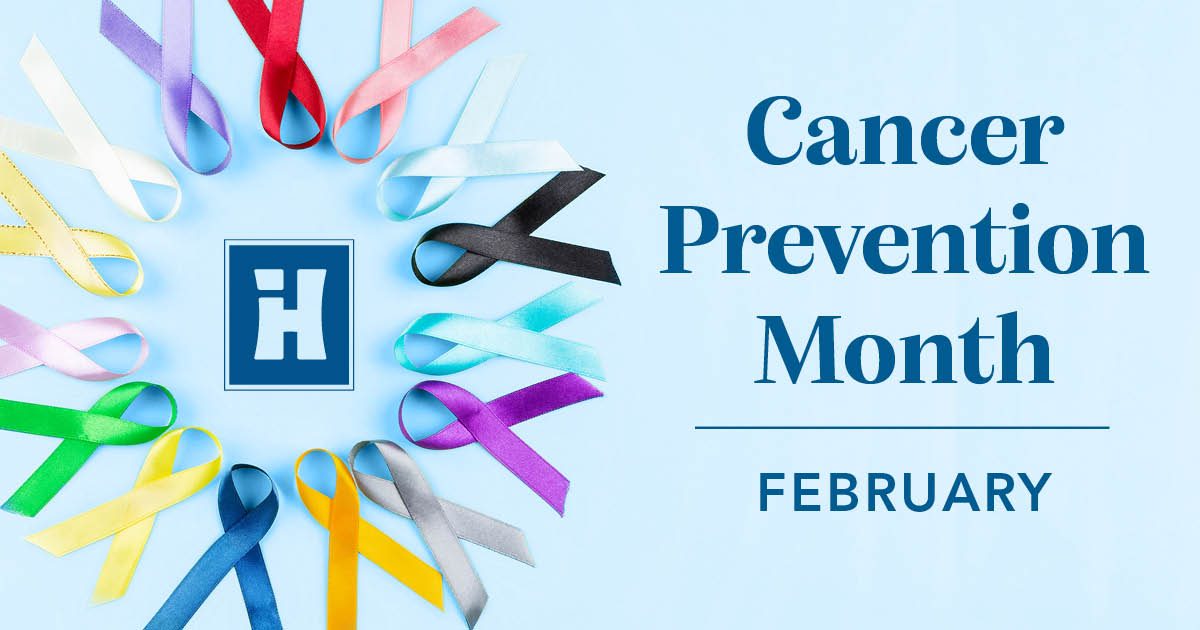February is National Cancer Prevention Month
- Category: Education, Cancer Care
- Posted On:
- Written By: Ashley Rains

Repeatedly, research shows that more than 40 percent of all cancers diagnosed and nearly half of all deaths from cancer in the U.S. can be attributed to preventable causes – things like smoking, excess body weight, physical inactivity and excessive exposure to the sun.
Just like going to the dentist or getting a check-up, cancer screening tests should be a part of your healthcare routine. These tests are used to find cancer before a person has any symptoms – it’s important to get regular screenings even if you are feeling fine.
Age 25–39 Screening recommendations
Cervical cancer screening is recommended for people with a cervix beginning at age 25.
Age 40–49 Screening recommendations
Breast cancer screening is recommended beginning at age 45, with the option to begin at age 40.
Colorectal cancer screening is recommended for everyone beginning at age 45.
At age 45, African Americans should discuss prostate cancer screening with a doctor.
Age 50+ Screening recommendations
People who currently smoke or formerly smoked should discuss lung cancer screening with a doctor.
Discussing prostate cancer screening with a doctor is recommended.
Prevention
Cancer | Primary Prevention | Secondary Prevention |
Breast | Weight control, increase physical activity, decrease alcohol consumption | Mammography screening |
Cervix | Tobacco control, limit sexual partners, Human Papilloma Virus (HPV) vaccine, excise pre-cancers | Pap smear; HPV screening |
Colorectal | Weight control, increase physical activity, tobacco control, excise pre-cancerous polyps | Colonoscopy, FIT test, other screening options |
Endometrium | Weight control, dietary change | -- |
Kidney | Control tobacco use, weight, and blood pressure | -- |
Larynx | Tobacco control, GI reflux control, decrease alcohol consumption, HPV vaccine | Laryngoscopic screening of smokers |
Liver | Hepatitis B & C vaccines; tobacco control, limit alcohol consumption, avoid aflatoxins, treat hepatitis | -- |
Lung & bronchus | Tobacco control, radon control, asbestos abatement, occupational safeguards | Spiral CT scan screening of healthy smokers age > 55 |
Melanoma of the skin | Limit sun exposure, wear sunscreen, remove pre-cancerous moles | Screening by dermatologist |
Oral cavity | Tobacco control, avoid chewing betel quid, limit alcohol consumption; HPV vaccine | Dentists screen users of tobacco and alcohol |
Ovary | Weight control, avoid hormone treatments | -- |
Pancreas | Control tobacco use, weight, alcohol use, control diabetes mellitus | -- |
Prostate | (Unclear) | Serial PSA testing |
Urinary bladder | Tobacco control, avoid dietary supplements, workplace exposures | -- |
General approaches to the primary prevention of cancer are as follows, with details below:
1. Lifestyle modifications and healthy living through public education or legislation
2. Cancer vaccines to prevent cancers caused by viruses
3. Control of radiation known to cause cancer
4. Regular cancer screening that may reveal pre-cancerous tissue that can be removed
Vaccines and cancer
Most of us know about vaccines given to healthy people to help prevent infections, such as measles and chicken pox. These vaccines use weakened or killed germs like viruses or bacteria to start an immune response in the body.
Most vaccines used to treat cancer work the same way, but they make the person’s immune system attack cancer cells. The goal is to help treat cancer or to help keep it from coming back after other treatments.
Some strains of the human papillomavirus (HPV) have been linked to cervical, anal, throat, vaginal, vulvar and penile cancers. In fact, most cervical cancers are caused by infection with HPV. Vaccinating children and certain young adults against HPV helps protect against cervical cancer and the other five cancers HPV can cause.
People who have chronic (long-term) infections with the hepatitis B virus (HBV) are at higher risk for liver cancer. Getting the vaccine to help prevent HBV infection may lower some people’s risk of getting liver cancer.
These types of vaccines are only useful for cancers known to be caused by infections. But most cancers, including colorectal, lung, prostate and breast cancers, are not thought to be caused by infections.
Infirmary Cancer Care stands with our patients through our continuum of care: prevention, early detection, diagnosis, staging, treatment and remission – every step of the way. Call 251-435-CARE (2273) for more information and visit InfirmaryCancerCare.org for more information about prevention, screening and treatment.
